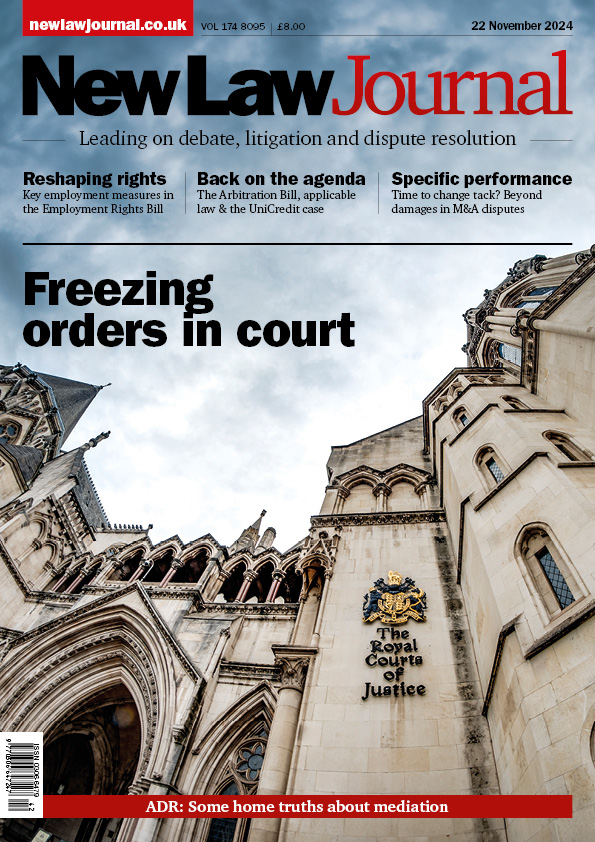THIS ISSUE

Freezing injunctions are 50 years old next year and still very much a developing area of law. In this week’s NLJ, Mary Young, partner, and Charlotte Dormon, associate, in the dispute resolution team at Kingsley Napley, take us through a raft of cases decided this year.
Should an immoral regime rise to power, it is tempting to think lawyers and the rule of law would act as a protective wall. But is this true? Sadly, history suggests not, as John Gould, chair of Russell-Cooke, writes in this week’s NLJ.
Retired costs judge John O’Hare discusses ADR in three contexts, in this week’s NLJ. He covers cases provisionally allocated to the small claims track, commercial litigation in the County Court, and claims opposed by liability insurers or by large self-insuring organisations such as local authorities or health authorities.
Ambiguity over the governing law of arbitration agreements continues to spark debate. In July, meanwhile, the government reintroduced the Arbitration Bill, which would have altered the outcome in September of the Supreme Court case, UniCredit. In this week’s NLJ, Valya Georgieva, senior associate, Penningtons Manches Cooper, and Ravi Aswani, barrister, 36 Group, examine the court’s reasoning and consider how the outcome might have differed if the Arbitration Bill, currently before Parliament, had been in force.
The remedy of ‘specific performance’ is little-used but can be ‘extremely beneficial’ in M&A disputes. In this week’s NLJ, Yasseen Gailani, partner, and Megan Hiluta, senior associate, Quinn Emanuel, explain why looking beyond the remedy of damages may pay dividends for clients.
In a system ruled by immoral leaders, it may be fanciful to believe that lawyers can or will make a difference: John Gould considers a chilling lesson from history
Even after five decades of freezing injunctions, the courts are still regularly asked to clarify the law: Mary Young & Charlotte Dormon round up this year’s causes of confusion
Charles Pigott outlines key employment measures contained within the government’s Employment Rights Bill
Yasseen Gailani & Megan Hiluta consider the advantages of the little-used remedy of ‘specific performance’
The Arbitration Bill is back on the agenda—but how would it have affected the outcome of the UniCredit case? Valya Georgieva & Ravi Aswani consider the implications
MOVERS & SHAKERS

Freeths—Ruth Clare
National real estate team bolstered by partner hire in Manchester

Farrer & Co—Claire Gordon
Partner appointed head of family team

mfg Solicitors—Neil Harrison
Firm strengthens agriculture and rural affairs team with partner return
NEWS
Conveyancing lawyers have enjoyed a rapid win after campaigning against UK Finance’s decision to charge for access to the Mortgage Lenders’ Handbook
The Crown Prosecution Service (CPS) has launched a recruitment drive for talented early career and more senior barristers and solicitors
Regulators differed in the clarity and consistency of their post-Mazur advice and guidance, according to an interim report by the Legal Services Board (LSB)
The dangers of uncritical artificial intelligence (AI) use in legal practice are no longer hypothetical. In this week's NLJ, Dr Charanjit Singh of Holborn Chambers examines cases where lawyers relied on ‘hallucinated’ citations — entirely fictitious authorities generated by AI tools
The Solicitors Act 1974 may still underpin legal regulation, but its age is increasingly showing. Writing in NLJ this week, Victoria Morrison-Hughes of the Association of Costs Lawyers argues that the Act is ‘out of step with modern consumer law’ and actively deters fairness







